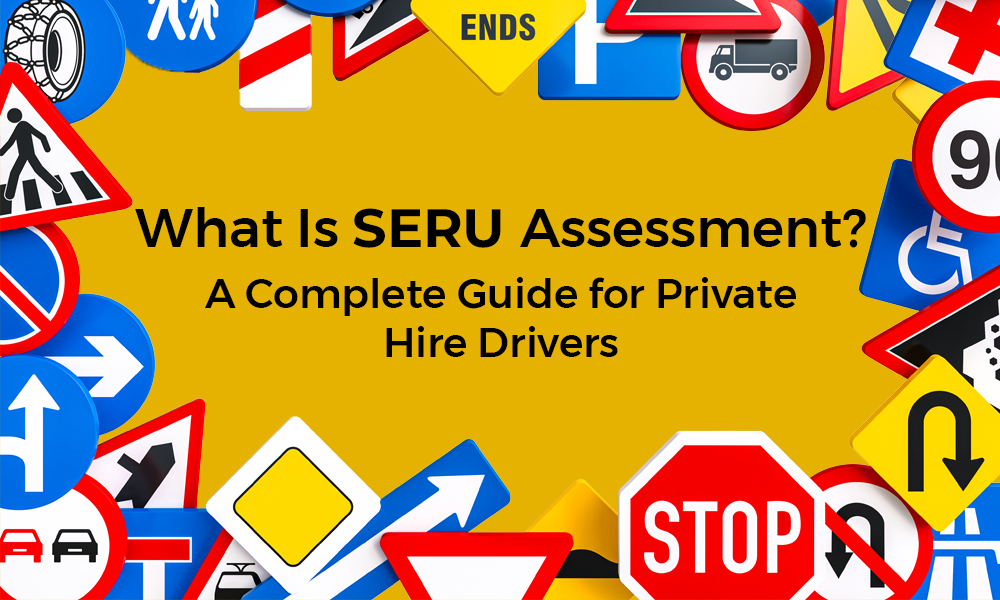Subtotal £0.00
If you’re looking to become a private hire driver in London, chances are you’ve come across the term SERU assessment. Whether you’re applying for your PCO licence for the first time or renewing your existing one, understanding what this test is—and how to pass it—is now a big part of the journey.
In this blog, we’ll break down what the SERU assessment is, why it’s important, who needs to take it, and how you can prepare the smart way. Don’t worry—we’ll keep it simple and straight to the point, just how most drivers prefer it.
What Is SERU Assessment?
Let’s start with the basics. SERU stands for Safety, Equality, and Regulatory Understanding. It’s a test introduced by Transport for London (TfL) to make sure that all private hire drivers understand the key responsibilities they have while working in the city.
The SERU assessment focuses on your understanding of:
- How to treat passengers fairly and equally
- Rules and regulations for working as a licensed driver
- How to stay safe while on duty
- Legal obligations under UK law
In simple words, it’s all about checking that you know the rules of the job, beyond just driving skills.
Why Did TfL Introduce the SERU Test?
Back in the day, drivers had to show they could speak and understand English by passing a TfL English language test or submitting a qualification. But now, TfL has updated its approach. The SERU assessment has taken a more central role in proving your ability to understand important information related to your job.
So, in many cases, this test also works as an alternative to the TfL English test, especially for drivers who haven’t submitted an approved English certificate.
Who Needs to Take the SERU Assessment?
If you’re wondering whether this applies to you, here’s a quick breakdown of who must take the SERU test:
- New applicants applying for their PCO licence
- Existing private hire drivers who haven’t submitted an English language certificate
- Drivers renewing their licence without meeting the updated SERU requirement
- Anyone who got a temporary licence and now needs to complete the SERU process
If you’re working (or want to work) as a PHV driver in London and haven’t proven your understanding of the rules, this test is for you.
What to Expect in the SERU Test
The SERU assessment is taken on a computer at a TfL-approved test centre. It’s not a verbal or driving test. You’ll be asked questions based on the official TfL handbook called the Private Hire Driver’s Handbook.
Here’s what the test covers:
- Safety: How to act in emergencies, basic first aid awareness, and reporting incidents
- Equality: Respecting all passengers, including those with disabilities
- Regulations: Understanding TfL rules, licensing conditions, and driver conduct
- Reading Skills: You’ll need to read short texts and answer multiple-choice questions
There are around 35 to 40 questions, and the test usually lasts around 45 minutes. It’s not extremely difficult, but it does require preparation, especially if English isn’t your first language.
How to Pass the SERU Assessment
Now comes the part everyone wants to know—how do you pass it on the first try?
1. Study the Official TfL Handbook
TfL has published a free PDF guide called the Private Hire Driver’s Handbook, which the test is based on. Make sure you read it thoroughly and understand each section.
2. Practice SERU Questions
Find practice materials or mock tests online. These will help you get familiar with the type of questions that come in the real exam. Repeating questions can help build confidence.
3. Join SERU Preparation Services
Getting professional help can make a big difference. This is where pcogo.co.uk can help you out (we’ll explain more below).
4. Book Your Test Early
TfL gives you a deadline to take the test. If you don’t take it in time, your PCO licence status may be affected. Don’t leave it till the last minute.
Is the SERU Assessment Hard?
The test isn’t difficult, but it requires basic reading skills and an understanding of the handbook. If you’re comfortable reading signs, notices, or job instructions in English, you’ll be okay, but that doesn’t mean you shouldn’t prepare.
Also, if you’ve been driving for years, don’t assume you’ll just know the answers. Some questions are about specific laws and official TfL procedures, not just common sense.
What Happens If You Fail the SERU Assessment?
Don’t panic. TfL usually allows drivers to rebook the test, but failing can delay your licence application or renewal. You’ll also need to wait before taking it again, and in some cases, re-pay the test fee.
That’s why it’s smart to take your preparation seriously the first time around.
How pcogo.co.uk Can Help You Prepare
If all of this sounds overwhelming, don’t worry. pcogo.co.uk is here to help.
We understand that most drivers are busy with work and family life, and don’t have time to figure everything out on their own. That’s why we offer complete SERU preparation services, designed to make things simple and stress-free.
Here’s what you get with pcogo.co.uk:
- Full SERU training based on TfL’s official handbook
- Mock tests and practice questions that feel just like the real thing
- 1-on-1 coaching sessions to go over difficult topics or answer questions
- Help with booking your SERU test at the right time
- Guidance for drivers who also need help with the TfL English language requirement
Whether you’re just starting your application or you’re worried about passing the test, our team is ready to support you every step of the way.
We’ve already helped hundreds of drivers across London prepare with confidence, and we’re ready to help you too.
Getting your PCO licence is a big step, and passing the SERU assessment is now part of that process. But with the right preparation and guidance, there’s no reason to stress.
Start your journey with the right support today.
Visit pcogo.co.uk for SERU test help, training, and private hire licence support made simple.
FAQs
1. What Does a SERU Test Consist Of?
The SERU test checks your knowledge of key areas like safety, equality, and regulations as a private hire driver. Expect multiple-choice questions about how to handle emergencies, treat passengers fairly, and follow the rules.
2. What Happens If You Fail SERU?
If you don’t pass the SERU test, don’t stress—you can always rebook it. Just keep in mind that failing could delay your PCO licence application, and you might need to pay the fee again.
3. How Hard Is the SERU Test?
It’s not an impossible test, but it does require some prep work. If you’re familiar with the TfL handbook and the basics of driver safety and regulations, you should do fine, though some questions may still be tricky without studying.
4. What Is the Pass Rate for the SERU Assessment?
The exact pass rate isn’t officially shared, but many drivers pass on their first try if they’re well-prepared. Understanding the TfL handbook and practicing common questions will make it easier to succeed.
5. How to Prepare for the SERU Test?
To get ready, read through the TfL handbook, take practice questions, and maybe even sign up for a prep service like pcogo.co.uk. Focus on the safety, equality, and regulation sections to increase your chances of passing.

